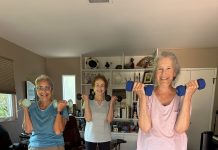I weeded through some files at the office recently, and came upon the abstract of a study done at the University of Michigan about eight years ago. The study author was concerned with relationships between adult children and their parents.
I probably filed it away hoping to get to it at some later time, so, as is my habit during cleaning endeavors, I settled back into a nest of paper on the office floor and began reading.
The author noted, “The parent-child relationship is one of the longest lasting social ties human beings establish.” She goes on to say that although the tie is often highly positive and supportive, there are commonly feelings of irritation and tension that cause problems and even rifts.
The article sparked my interest in part because we see an increase in the number of extended families needing counseling at our office during the fall, because of waters that get choppy after lots of time together in the summer, or to prepare for the holidays which lurk just around the corner from Labor Day.
But the larger reason the article caught my interest is that our own annual family vacation takes place at the end of August.
For years we’ve gone back to the Midwest to our family’s home on a lake, where we ski, swim and relax. The family has grown, and now our party comprises my husband and me, our children and their families, which include a bunch of small people under 4 years old. We all manage to squish ourselves into a tidy one-story brick home with a dock just feet from the front door. There’s a hammock beneath a sprawling oak, a tire swing and an armada of floating devices. Our kids learned to swim and ski there, and now their children are nearly ready for their own tiny skis.
You can imagine the many possibilities for chaos and lack of harmony – those are the same in every family. Nature instructs the very youngest to insist that their needs be met immediately, or they dole out ear-piercing consequences. The new parents are not completely used to the idea that almost none of their own needs will be met (and maybe not for a very long time).
This brings me back to the substance of the U of M study: what was it that caused the most irritation, tension and unhappiness among the study’s 500 participants?
The giving of unsolicited advice was No. 1 on the list of harmful ingredients in extended families. Apparently, it’s easy for us to assume that since we have been around the block a few times, we should share our wisdom and point out nifty ways for our children to improve their lives.
Not so.
The study – and common sense – tells us that the advice is invariably perceived as a “correction” and often as “criticism.”
There isn’t a lot we can do about basic personality style differences within a family, but veering away from landmines like advice-giving does help.
The study, whose data was analyzed at Purdue University, says it’s mostly the mother who dispenses the advice that is unsolicited. I am forever grateful to a wise friend who warned me that MOM is an acronym for “Masking tape Over Mouth.” She related this to me many years ago with a solemn face after witnessing one of those “Honey, you really should….yada yada” moments between me and one of the kids.
I’ll always remember that warning, as well as her Rule No. 2 for family harmony: Never Talk about Anyone Who’s Not in the Room.
All this sounds simple, but the switch takes a lot of work. It’s well worth it, though, and at the end, you get to just sit in a hammock with a great book and let it all happen instead of being The Guide and Knower-of-All. Turns out that adult children need the same thing from us that they give their small children, and that is, an acknowledgment that they’re right on track: “Good job!” I don’t need to say it out loud, but keeping the thought in my head reminds me to keep my mouth closed.
One of the rules of water skiing is to always take along an “observer” whose job is just to watch the guy in the water. I think I’ll take on that role for the whole trip, but not only on the boat.
Dr. Ruth Wimsatt lives and practices in Newport Beach. She can be reached at ruwimsatt@gmail.com or 949-222-3285.




